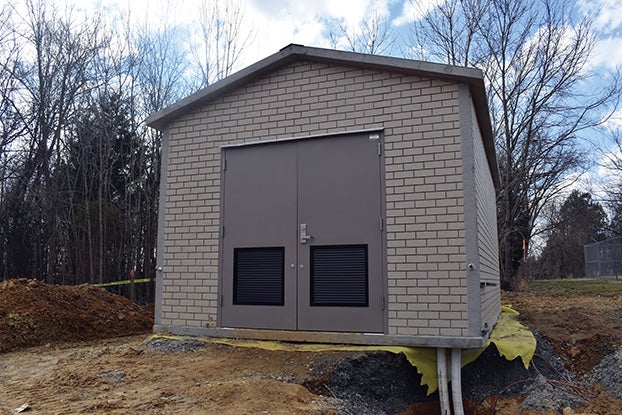Dukeville-area water system violates state quality standards
Published 5:16 pm Wednesday, February 16, 2022

- This small, unadorned building is at the forefront of the county's efforts to eliminate lead in the water in several homes on the northeast water system. The chemical booster pump station will allow Salisbury-Rowan Utilities to have more control over the pH and beneificial chemicals being added to the water on the system. Ben Stansell/Salisbury Post
SALISBURY — Rowan County on Wednesday received a notice of violation from the North Carolina Department of Environmental Quality for failing to meet water quality parameters on its northeast water system.
The notice comes as the county continues to work toward fixing water quality problems for customers on the system. The system, which was completed and operational in 2018, serves about 160 connections and several hundred residents in the community commonly referred to as Dukeville. While the system is owned by the county, the water is treated and provided by Salisbury-Rowan Utilities.
Testing conducted in fall 2018 identified elevated levels of lead in the water of several homes on the system. High levels of lead in drinking water can cause serious health problems, including damage to the brain and kidneys.
The county conducted additional water testing in early 2021 and sent Brita water filtration pitchers to customers on the system. The county also distributed instructions on how customers could use water safety in their homes.
The additional sampling identified an elevated presence of lead in about nine homes on the system. SRU Director Jim Behmer said the source of lead is likely within the plumbing of individual homes, not from the water system.
NCDEQ gave the county a deadline of June 12, 2021, to gain compliance with the lead and copper limits.
With consultation from Hazen and Sawyer Engineering firm and researchers at Virginia Tech, the county identified steps to correct the problem. The Rowan County Board of Commissioners in April approved plans to build a chemical booster pump station at the entry point to the northeast water system on Long Ferry Road.
The station will allow SRU to have more control over the pH of water entering the system and allow the utility to inject additional amounts of a chemical called zinc orthophosphate into the water. Zinc orthophosphate acts as a corrosion inhibitor, coating the pipes inside homes and preventing lead seepage.
In the meantime, SRU agreed to adjust its treatment of water at its primary plant in Salisbury by switching from a polyphosphate blend to using zinc orthophosphate and increasing its pH. The county’s plan, which was submitted and approved by the NCDEQ in April, asserted it would maintain a designated pH between 7.2 and 7.8 and an orthophosphate concentration of at least 1.0 mg/L. The county was optimistic it would be found to be in compliance.
Relying on water quality data submitted by SRU from July 1 through Dec. 31, NCDEQ determined the line didn’t maintain parameters. While the notice of violation doesn’t explicitly say what triggered the violation, Behmer said the likely culprit was pH level dropping below 7.2. Behmer said many factors that can cause pH level to fluctuate, including the temperature.
The chemical booster pump station will allow SRU to tweak the pH level of water on the northeast water system without further increasing the pH of water sent out to its roughly 52,000 other customers.
The notice of violation does not carry a monetary fine, but it specifies provisions the county must follow. The county must immediately begin to operate the water system within the previously designated pH and zinc orthophosphate parameters. The also county must issue a public notification of the violation and submit evidence of the notification to the state’s public water supply section.
Additionally, the county must continue to monitor lead and copper and the levels of pH and orthophosphate within the system through the end of June.
“We appreciate and respect the state’s authority,” County Manager Aaron Church said in an emailed statement. “We will comply with the requirements set forth in the notice of violation. We regret the pump station is not complete and will continue to strive for the successful completion.”
Church said supply chain disruptions impeded construction of the chemical booster pump station. While the building is constructed, the county has not received some necessary equipment. The most important piece of equipment, an in-line mixer that will ensure proper mixing of sodium hydroxide for pH adjustment and zinc orthophosphate supply, is expected to arrive in March.
Along with the chemical booster pump station, the county plans to completely replace the plumbing in homes on the northeast water system that have tested for elevated levels of lead. Hazen and Sawyer will manage the project, and the county plans to move forward with the project “as soon as possible.”
There are still dozens of customers on the northeast water system that have not participated in the county’s water sampling efforts. The county is offering water sampling services at no charge to the customer. Customers who are willing to participate in the testing can contact Church at 704-216-8180.





